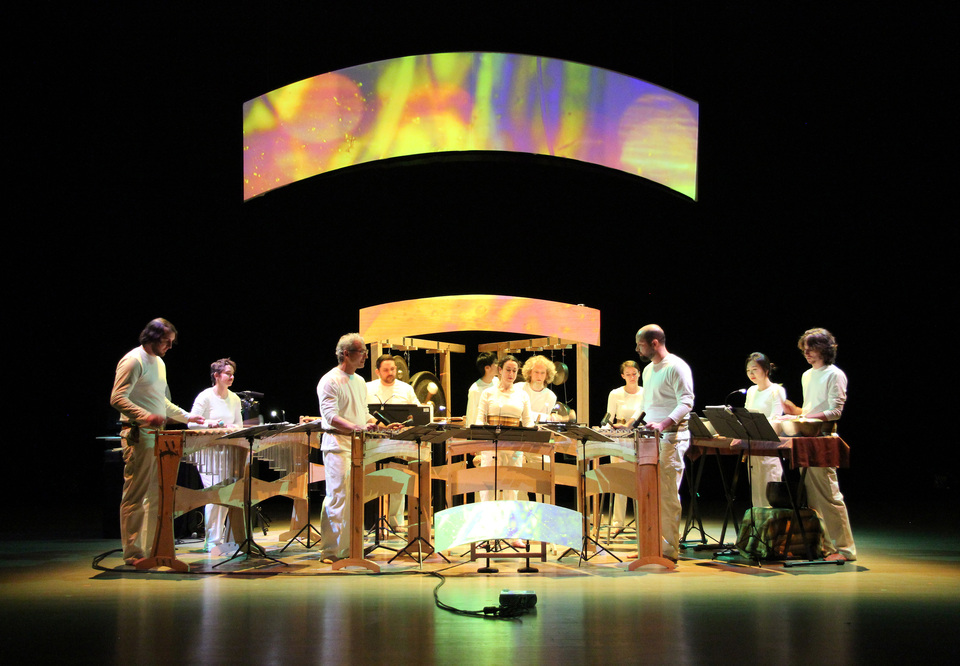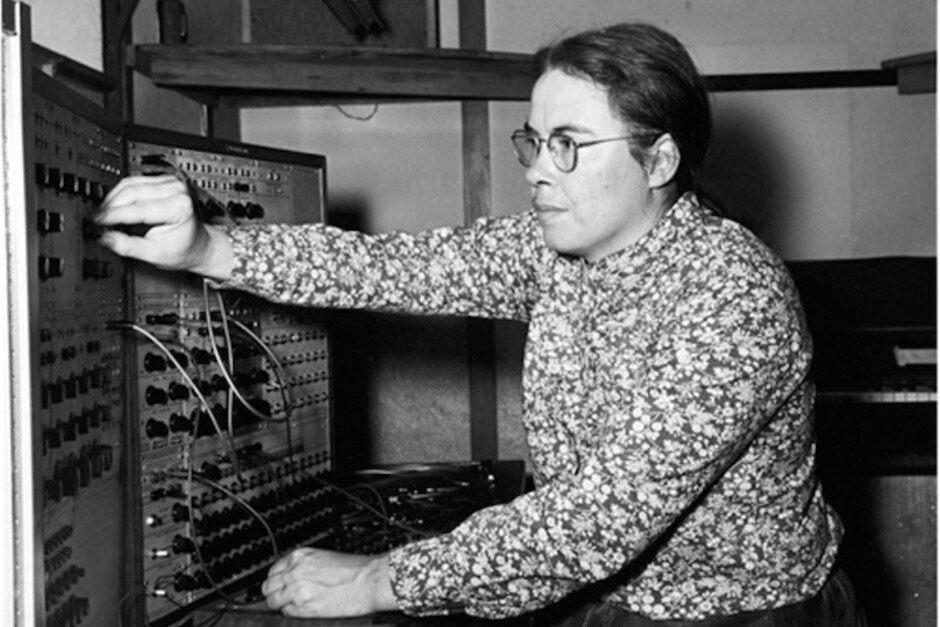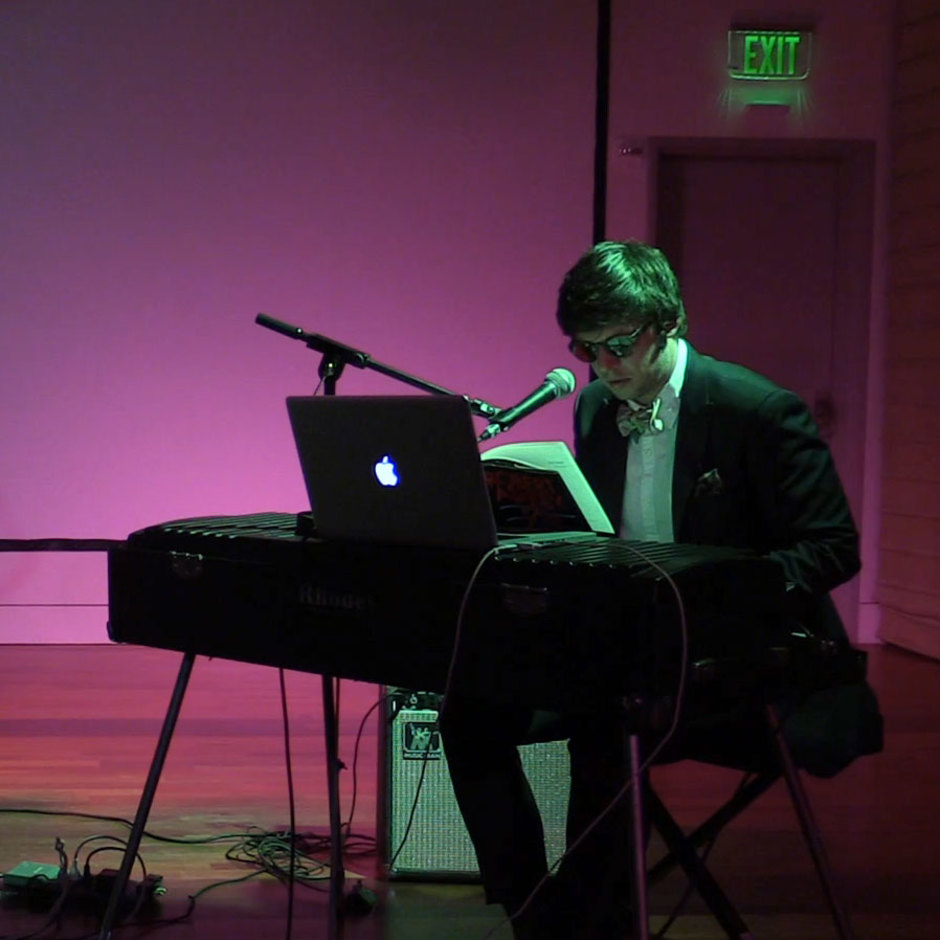
Lightbulb Ensemble + Ghost Ensemble
Pioneer Works and Indexical present a night of hypnotic and meditative music from Lightbulb Ensemble (Oakland) and Ghost Ensemble (NYC).
Lightbulb Ensemble performs on custom-built metallic and wooden bar instruments, built and tuned by ensemble director Brian Baumbusch after years of immersion into Balinese gamelan and its music. The ensemble’s music uses the intricate, interlocking rhythms of Balinese gamelan, filtered through the lenses of 1970s Downtown minimalism and the tuning and instrument-building tradition of Harry Partch. The ensemble will give the NYC premiere of the hour-long “Mikrokosma,” co-composed by Baumbusch with ensemble member and contemporary Balinese gamelan scholar Wayne Vitale.
The seven-member Ghost Ensemble performs meditative, experimental music, specializing in the introspective work of Pauline Oliveros and ensemble director Ben Richter. They will give the premiere performance of Andrew C. Smith’s “We remember not the word, but the sound of the word,” composed for the ensemble. Smith’s work takes language, its sound, and its rhythm, as a starting point for composition, using computer analysis techniques borrowed from linguistics and spectral music to shape fragments of language into music for instrumental performers. Ghost Ensemble will also perform Ben Richter’s “Healing Ghost,” written for the ensemble, as well as Pauline Oliveros’s “Angels & Demons,” Juste Janulyte’s “Psalms,” Alan Hovhaness’s “Chahagir,” and Simon Steen-Anderson’s “Study for String Instruments #1.”
Lightbulb Ensemble
“[Lightbulb Ensemble’s] refreshingly innovative performances challenge conventional notions of how gamelan music should sound" —San Francisco Classical Voice
Lightbulb Ensemble is a new music percussion ensemble that champions experimental music, instrument building, and contemporary gamelan. The ensemble emerged from the culture of new music in the Bay Area centering around Mills College, and the longstanding artistic exchange between Bali and the United States fostered by Gamelan Sekar Jaya. The group performs on steel metallophones, wooden marimbas, and other instruments designed, tuned, and built by the founder and director Brian Baumbusch. Performing only new repertoire, the group presents in-house compositions and collaborates with other artists of the new music community, including The Paul Dresher Ensemble, The Jack Quartet, The Center for Contemporary Music, Jessika Kenney and Eyvind Kang, among others.
“Mikrokosma” is an hourlong suite of pieces that form a musical exploration of the microcosms of BaliHindu cosmology, where the universe is reflected and recreated, fractallike, in all its parts. “Mikrokosma” is the conception and musical creation of Wayne Vitale – a founding member and past director of Gamelan Sekar Jaya – and Brian Baumbusch, director of the Lightbulb Ensemble as well as designer, tuner, and builder of the instruments. Both composers have been immersed in the music of Bali for many years, and in the world of experimental, hybrid music that is thriving in Bali and in the California Bay Area. “Mikrokosma” is a product of that interaction.
Ghost Ensemble
“Ghost Ensemble plays with a notable intensity … all these pieces use sound to seek an altered consciousness, from a meditative awareness to a look, perhaps, into a different dimension.” —New York Classical Review (George Grella)
Ghost Ensemble performs experimental music that explores the experience of listening: the familiar can become unfamiliar, while unexpected and unexplored places offer new layers of beauty. Founded in 2012, the group draws from diverse contemporary and ancient practices to create a synthesis in which the unity of the sensory experience is paramount.
Ghost Ensemble is Martha Cargo (flutes), Sky Macklay (oboe), Ben Richter (accordion), Hannah Levinson (viola), and Joshua Morris (contrabass), with guests and collaborators including Meaghan Burke (cello), Somna M Bulist (harp), Damon Loren Baker (electronics), James Ilgenfritz (contrabass), and percussionists Joe Tucker, Ellery Trafford, and Brooks Frederickson. Composers who have created new works for the ensemble include Kyle Gann, John Rot, Leonie Roessler, Andrew C. Smith, and composer-members Ben Richter, Sky Macklay, Joshua Morris, and Somna M Bulist.
Pioneer Works
Pioneer Works is a center for research and experimentation in contemporary culture. Through a broad range of exhibitions, performances, arts and science residencies, and educational programs, Pioneer Works seeks to transcend traditional disciplinary boundaries, foster community, and provide a space where alternative modes of thought are supported and activated in tangible ways.
The organization was founded in 2012 by artist Dustin Yellin and is located in a 25,000 square feet manufacturing warehouse in Red Hook, Brooklyn. After an extensive renovation, the facility now houses artist studios, exhibition and performance spaces, a science lab, a recording studio, and other spaces as needs arise. The floor plan is open and flexible, encouraging a transparent, collaborative environment where international artists, musicians, scientists and educators can co-exist and create together. Pioneer Works is a non-profit 501©(3).
Juste Janulyte:
Psalms
Pauline Oliveros:
Angels & Demons

Simon Steen-Anderson:
Study for String Instrument #1
Andrew C. Smith:
We remember not the word, but the sound of the word

Language is an activity where we repeat ourselves and others — a negotiation of similarity and difference of sounds, giving us similarity and difference of meaning. It is the network of repetition among voices that allows us to communicate. This piece is a repetitive text which I wrote, recorded, and transcribed using custom software to translate each vowel and consonant into musical notation. Closing each section is the phrase “we remember not the word, but the sound of the word.” The similarity is in the gesture, but the difference is in the sound. — ACS
Andrew C. Smith is a composer and keyboardist living in Santa Cruz, California. His music often involves just intonation tunings, repetition, and language at the threshold of making sense. In addition to his work with language, he uses computers in his everyday artistic practice, often using electronic means to manipulate sound and text, using the results of these manipulations in his work.
He has been producing concerts and recordings since 2011, and is currently the Executive Director of Indexical, a nonprofit organization based in Santa Cruz, California. He has previously produced events at Carnegie Hall, Lincoln Center (Alice Tully Hall), Bohemian National Hall, and other venues as Managing Director of the S.E.M. Ensemble (Brooklyn, NY), and has worked for the Seattle Symphony (Seattle, WA) and Issue Project Room (Brooklyn, NY).
His music has been performed by sfSound, String Noise, Guidonian Hand Trombone Quartet, Séverine Ballon, Ostravaská banda, and S.E.M. Ensemble. He studied English and music composition at Willamette University and Trinity College Dublin.
Alan Hovhaness:
Chahagir
Ben Richter:
Healing Ghost
Ben Richter is a composer, accordionist, and director of Ghost Ensemble. In his music, sound worlds of constant transformation emerge from shifting timbre gradients and microtonal fluctuations, exploring alternative modes of time perception. Wind People, “a massive drone of lapidary detail” that “thrums, throbs, and glides with surging and ebbing density” (Peter Margasak, Bandcamp Daily), was featured on Ghost Ensemble’s LP We Who Walk Again (2018, Indexical). As an accordionist, Ben has explored the microtonal potential of the instrument through collaborations with Pauline Oliveros and Phill Niblock; his immersive just-intonation accordion album Panthalassa: Dream Music of the Once and Future Ocean (2017, Infrequent Seams) was hailed by Stephen Smoliar as “likely to offer a profound impact on the very nature of listening.”
Brian Baumbusch & Wayne Vitale:
Mikrokosma
Since its founding in 2012, Ghost Ensemble has dedicated itself to long-term study of experimental music with a focus on new perceptual perspectives that explore the experience of listening. The group has extensively explored the Deep Listening philosophy of Pauline Oliveros, collaborating with the composer to inaugurate the release of her Anthology of Text Scores at Eyebeam in 2013, and has previously premiered new works written for the ensemble by John Rot, Leonie Roessler, Kyle Gann, Lucie Vítkova, Sky Macklay, and Somna M Bulist. Ghost Ensemble’s performance techniques realize fragile, liminal sounds, produced by virtuosic performers who are experts on their instruments. These practices can only be realized through long-term collaborations between composers and performers. Tax-deductible donations to Ghost Ensemble’s commissioning project support a crucial stage of this long-term relationship between composers and performers, and help to shape its future.
The Lightbulb Ensemble is a new music percussion ensemble that champions experimental music, instrument building, and contemporary gamelan, “whose refreshingly innovative performances challenge conventional notions of how gamelan music should sound” (SF Classical Voice). The ensemble emerged from the culture of new music in the Bay Area centering around Mills College, and the longstanding artistic exchange between Bali and the US fostered by Gamelan Sekar Jaya. The group performs on steel metallophones, wooden marimbas, and other instruments designed, tuned, and built by Brian Baumbusch, Lightbulb’s founder and director. Performing only new repertoire, the group presents in-house compositions and collaborates with other artists of the new music community, including The Paul Dresher Ensemble, The Jack Quartet, The Center for Contemporary Music, Jessika Kenney and Eyvind Kang, among others.
